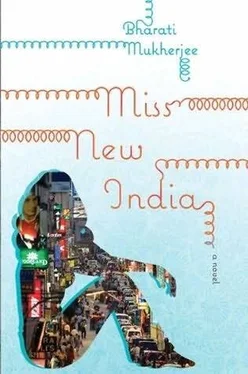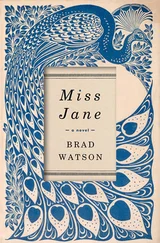When she listened to her parents at dinner, she wanted to scream, "Life isn't like that! Nobody cares! It doesn't matter! Nothing matters!" Like any American teenager, she wanted to scream at her parents, "You don't know a thing!" But every day the same food was bought and every night it was cooked and served in the same way, and the same rumors and gossip were chewed over, the same questions asked, with the same answers given, and everything was meaningless.
"Did you have to fight your parents in order to come to India?"
From the way he laughed, she could tell she must have said something funny. "Why would they stop me? I've got an auntie in Bangalore, and I was with my mother's parents in Rishikesh until they died, and I've got my father's folks in Kolkata and cousins everywhere. The only hard part is finding a way of avoiding them. A billion people in this country, and it feels like half of them are relatives! Just imagine how helpful they'd be in tracking down gay bars and whorehouses! I went out with a bunch of hijras-a blast! Natural performers." What he referred to as a "gay bar" sounded like a happy place, but she wondered how a Brahmin boy from a good family would be admitted to a whorehouse, and when she thought of hijras and their leering made-up faces and men-in-women's-clothing and flowers in their oily hair, she felt sick. Performers? They were perversions!
They talked a bit about their parents, how hers were so loving and concerned, how supportive they were. Lies, lies! Ask me, and I'll tell the truth, but he didn't. He said he hadn't talked to his parents in weeks but sent them emails of some of his photos. She made her father into a bank manager, hoping that would impress; he said his father ran a kind of telephone company, but the man was housebound and partially crippled, and his mother wrote novels about India for American women. In their mutual inventions, they weren't so far apart.
"I was just thinking," he said, as he tore out a sheet from a pocket notebook. "My mother would love to sit down with you!" Why? she wondered. I'm nothing special. She was about to ask why when he announced, as if in explanation, "She is Tara Chatterjee." The name meant nothing to Angie except that Tara was a common enough first name and Chatterjee one of the few Bengali Brahmin surnames, all of which meant that there were probably a dozen Tara Chatterjees of varying ages even in Gauripur. He took in her blank look and laughed. "The Tara Chatterjee who writes, that's my mom. You mean you haven't read her stories? Anyway, here's my San Francisco phone number. And let me give you my auntie's Bangalore number. I stay with her when I am there." He scribbled a telephone number on the back of his San Francisco card. "You'll get there if you really want to," he said.
Bangalore? How did he guess?
***
THE GIRL in Shaky Sengupta's formal glossies was definitely not Angie. Not even a version of Anjali. In fact, as Rabi had said, there was no one there, and that, of course, triggered a new wave of interest. The nature of Shaky's art was to drain personality from the frame and replace it with fantasy. She'd always seen herself as too tall and thin, made for T-shirts and jeans, her narrow dimensions lost inside a sari. But Shaky's magic had managed the impossible, implying cleavage and billowy wonders under the sari, along with the smudgy dimple. She was luminous and mysterious, a synthetic bonbon of indeterminate age. Shaky was a master of light and shadow.
While her parents were fretting over the caste purity and social standing of interested probasi Bengalis with twenty-something sons, vowing this time they'd wipe out the stigma of their other daughter's divorce, Anjali was imagining herself in the real world behind Shaky Sengupta's pull-down screens. The beaches of Australia were beckoning, the Ginza, the Great Wall, why not? Even in Gauripur a girl could dream, especially a reasonably attractive girl with good English, a dimple and cleavage, and an adventurous nature.
The girl/woman in the portrait had nothing to fear from an uncertain marriage market. She would definitely find a husband. She could imagine the crashing of teacups around the world as thousands of bachelor engineers, the loose network of longing that had thus far yielded nearly fifty interested inquiries from half a dozen countries, checked out the new photo on Bengaliweddings.com. She feared having to go through with the Bangalore alternative. When Peter first proposed it, Bangalore had seemed the answer to all her fears and all her anger. Bangalore was a great game, a way of profitably using her English, avenging Sonali, and becoming independent, while picking and choosing among thousands of boys with good English and the same ambition.
But that was an innocent Anjali and a different Peter. That was before she got swept up in the marriage current and before her vanity was engaged. The Bangalore commitment meant packing a bag and sneaking out and admitting she wasn't desirable enough to overcome the stigma of coming from nowhere, and her parents' poverty. Her parents could live with another failed marriage. They could tolerate her misery so long as they felt they'd done their duty. But they would not survive the shame of a second daughter's act of defiance and insubordination.
She wanted to-no, she needed to talk to Peter about the photograph of Ali that Rabi Chatterjee had shown her. But she didn't dare; so one day Shaky Sengupta's bridal portrait in hand, faking jauntiness, she showed up-as she now thought of it-at Peter and Ali's. This was a forbidden visit, according to her father's newest rules, but at least she was in a sari. She presented Shaky's marriage portrait and waited for the response. "Well… would you marry this girl?" she asked.
Peter frowned and then passed it on to Ali.
He checked it twice and gave it back.
"Who is she?" Ali asked in Hindi.
Peter said, "I think this picture is a monstrosity. So what kind of monster is it supposed to attract?"
He'd approved of everything she'd ever done. She was the model by which he judged all his students. She could only answer, "It was my mother's idea."
Peter stiffened. "Your mother, God help us. You're not a little girl anymore, Angie. If you get married-and I don't care how good he looks or what his prospects are-if you get married based on a picture like this, you'll get exactly the treatment you deserve."
She smiled, putting on that big halogen beam that always came to her rescue. "I met Rabi Chatterjee. He showed me pictures he'd taken of you. And Ali."
Peter frowned and looked away. He nodded at the mention of the photos but said nothing. No one was the person she thought she knew.
"Rabi Chatterjee is a serious young man. He has an indestructible ego-that's a good thing. I had one too. It means he's got the inner strength to stand up to convention. And he brings you along, into his wildest plans. He could be going to any college he wanted, so what is he doing? Walking to villages and taking buses and third-class trains. He reminds me of a younger me. He said, 'You can't take pictures of India through a limousine window.' His father happens to be Bish Chatterjee, and Bish Chatterjee happens to be the richest Bengali in the world, one of the ten richest overall-I mentioned him in B. Comm. Honors, but I never expected his son would be sitting in my rooms taking my picture-he speeded up the way computer networks communicate. The world is small, but Gauripur is huge: remember that. Every cell phone uses CHATTY technology. Some day that boy who took your picture will be even richer. And I don't imagine he told you any of that."
"He said his father owns a telephone company, and his mother writes books about India for American ladies." Why would he lie to her? Sleeping in buses and servants' hotels was the least impressive thing she could imagine. She didn't understand this American behavior. Impressive people looked and acted prosperous and confident, or else what's the use? "Maybe he's looking for a wife?"
Читать дальше












